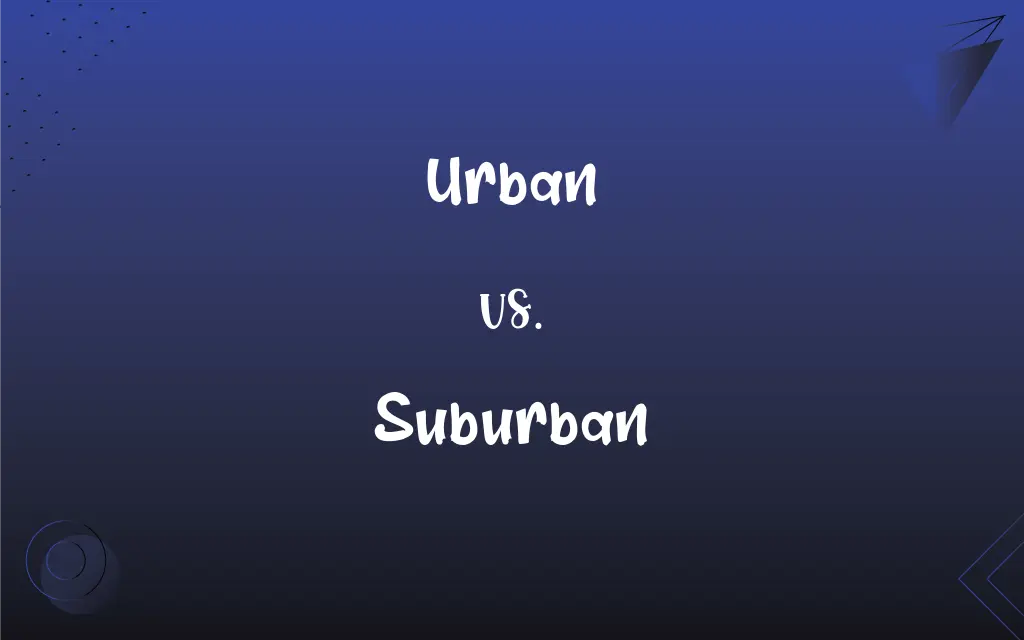Urban vs. Suburban: What's the Difference?
Edited by Aimie Carlson || By Harlon Moss || Updated on October 9, 2023
Urban refers to city-like areas with high population density and infrastructure, while suburban describes outlying districts of a city, often residential with more open space.

Key Differences
Urban areas typically exemplify regions that boast a dense population and a vast array of infrastructure. In contrast, suburban regions conventionally illustrate areas on the outskirts of cities, which notably possess a more scattered population and distinctly more open spaces.
The urban landscape is often synonymous with bustling activity, encapsulating a spectrum of businesses, high-rise buildings, and various amenities. Contrariwise, suburban areas commonly furnish a quieter environment, providing family-friendly amenities and typically offering houses with yards.
In an urban context, transportation encompasses a well-developed public transit system, facilitating efficient travel across the area. On the other hand, suburban areas might have limited public transit, thus making residents more reliant on personal vehicles for commutation.
From a socio-economic perspective, urban areas can often display a varied mix of income levels and occupational types, fostering a multifaceted social environment. Suburbia tends to lure a somewhat homogeneous demographic, often middle to upper-middle class, seeking tranquility away from urban hustle.
Urban regions frequently encounter issues like traffic congestion, noise, and higher living costs, due to denseness and competition. Suburban locales, conversely, might offer more affordable housing options and a calmer lifestyle, albeit potentially with longer commute times to city centers.
ADVERTISEMENT
Comparison Chart
Population Density
High
Lower
Infrastructure
Extensive and varied
More limited and residential-focused
Lifestyle
Fast-paced, bustling
Quieter, more relaxed
Housing
More apartments and high-rises
Predominantly houses with yards
Public Transit
Well-developed and widely utilized
Less prevalent, more car dependence
ADVERTISEMENT
Urban and Suburban Definitions
Urban
Urban settings often showcase great diversity.
The urban region was a mosaic of various cultures and cuisines.
Suburban
Residential: Suburban areas predominantly feature residential zones.
The suburban streets were lined with houses and parks.
Urban
Urban locales boast extensive infrastructure.
Urban centers are marked by their impressive skyscrapers and businesses.
Suburban
Commuter Communities: Suburbs are often inhabited by individuals who commute to work.
Many suburban residents travel to the city for work.
Urban
Urban living can be financially demanding.
The urban housing market is notoriously expensive.
Suburban
Family-Oriented: Suburbs often cater to family lifestyles.
Suburban schools and parks create a family-friendly environment.
Urban
Life in urban areas is typically fast-paced.
In an urban lifestyle, everyone always seems in a hurry.
Suburban
Less Populated: Suburbs are notably less densely populated than cities.
The suburban neighborhoods were spacious and tranquil.
Urban
Urban areas are characteristically populated densely.
The urban environment was abuzz with countless people and vehicles.
Suburban
Greener: Suburban zones often provide more green spaces than urban areas.
The suburban environment was dotted with trees and gardens.
Suburban
Of, relating to, or characteristic of a suburb.
FAQs
Why do people prefer suburban living?
People might prefer suburban living for a quieter environment, more space, and potentially family-friendly amenities.
Are suburban areas considered rural?
No, suburban areas are not rural; they are outskirts of urban areas, usually characterized by residential neighborhoods, lower density, and more green spaces.
Is living cost typically higher in urban or suburban areas?
Living costs are generally higher in urban areas due to higher demand and limited space.
What are the common housing types in suburban areas?
Suburban areas commonly feature detached houses, often with yards and additional space compared to urban dwellings.
Does urbanization refer to the growth of urban areas?
Yes, urbanization refers to the increase in the size, status, or population of urban areas, often due to migration from rural or suburban areas.
What defines an urban area?
Urban areas are characterized by high population density, varied infrastructure, and a plethora of amenities and services.
Can urban areas become suburban over time, or vice versa?
Yes, changes in development, population, and infrastructure can shift areas between being more urban or suburban over time.
Is crime rate a differentiating factor between urban and suburban areas?
While it’s common to perceive urban areas as having higher crime rates due to population density, crime exists in both urban and suburban areas, just potentially differing in nature and frequency.
Is the cost of education typically higher in urban areas?
It can be. Urban areas might present higher costs in private education and other educational programs due to demand and competition.
How does architecture differ between urban and suburban environments?
Urban architecture often includes high-rises and compact buildings, while suburban architecture leans towards spacious houses and structures.
How is public transport different in urban vs. suburban areas?
Urban areas typically have extensive public transport systems, while suburban regions may have limited options, promoting reliance on personal vehicles.
How do schooling options compare in urban and suburban contexts?
Urban areas might offer a wider variety of schooling options, while suburban areas may provide schools with potentially smaller student populations.
Are job opportunities more prevalent in urban areas?
Often, yes. Urban areas typically host a wide array of job opportunities across various sectors, given the concentration of businesses and organizations.
How do entertainment options compare between urban and suburban areas?
Urban areas often boast a wider variety of entertainment options (theaters, dining, nightlife), while suburban locales might offer fewer, more family-oriented options.
Is access to healthcare facilities different in urban and suburban areas?
Typically, urban areas host numerous healthcare facilities, while suburban areas might have limited options requiring travel to nearby cities for specialized care.
Are urban areas always noisy and crowded?
Not always, but urban areas tend to be busier and noisier due to the population, transportation, and activities occurring.
Can a suburban area develop into an urban area?
Yes, with increased development, population growth, and infrastructure expansion, suburban areas can transition into urban areas over time.
How do shopping facilities vary between urban and suburban regions?
Urban areas may offer varied shopping with numerous stores and malls, while suburban areas might have fewer, potentially larger shopping centers.
Are sports facilities and events more common in urban areas?
Generally, yes. Urban areas often host various sports events and have numerous facilities due to the larger and diverse population.
Which areas are often more multicultural, urban or suburban?
Urban areas tend to be more multicultural due to the amalgamation of various cultures, businesses, and opportunities attracting a diverse populace.
About Author
Written by
Harlon MossHarlon is a seasoned quality moderator and accomplished content writer for Difference Wiki. An alumnus of the prestigious University of California, he earned his degree in Computer Science. Leveraging his academic background, Harlon brings a meticulous and informed perspective to his work, ensuring content accuracy and excellence.
Edited by
Aimie CarlsonAimie Carlson, holding a master's degree in English literature, is a fervent English language enthusiast. She lends her writing talents to Difference Wiki, a prominent website that specializes in comparisons, offering readers insightful analyses that both captivate and inform.
































































